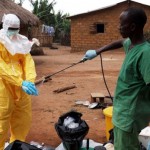 During the coronavirus pandemic, significant attempts have been made to learn lessons from previous pandemics. A recent paper from the University of Chicago explored the Ebola outbreak to look for lessons, and believe they found some in terms of the importance of public trust in health institutions.
During the coronavirus pandemic, significant attempts have been made to learn lessons from previous pandemics. A recent paper from the University of Chicago explored the Ebola outbreak to look for lessons, and believe they found some in terms of the importance of public trust in health institutions.
The study assessed the state-run healthcare operations in Sierra Leone during the outbreak, and found very low levels of trust in government-run facilities, which resulted in a faster and deeper spread of the disease.
For instance, when people expect treatment to be of poor quality, they tend to stay away from the facilities, and thus remain both untested and untreated. The paper highlights how relatively simple interventions can increase the numbers seeking treatment by 60%, which the authors believe reduced the reproduction of the virus by 19%.
“Intervening to increase the community’s involvement with the local health clinics led them to have greater confidence in the government health system and partake in more medical screenings during the outbreak,” they say. “This insight is important for government and other leaders seeking to flatten the curve of infection during the coronavirus pandemic, as guidance about social distancing and other vital steps is not being universally followed.”
Stopping the spread
The researchers assessed 254 different state-run health clinics, which between them covered around 1 million people, or 15% of the country’s population. The government had implemented a couple of interventions designed to increase both trust in the country’s health system, and subsequently the usage of it.
The first of these interventions saw community members invited to participate in discussions with their local health clinic. The meetings were designed to allow them to articulate their concerns and hopefully result in services improving.
During these sessions, staff at the clinic would also share health advice with the community, with the idea that patients become willing and able to hold healthcare staff to account.
The results suggest that social accountability interventions, such as this one, helped to increase the amount of testing and reporting during the Ebola outbreak. This resulted in 30% fewer deaths from the disease in areas that experienced the intervention.
“This insight is important for government and other leaders seeking to flatten the curve of infection during the coronavirus pandemic,” the researchers explain.
Incentivizing care
The second intervention involved an incentive program that was given to healthcare workers at clinics that were successfully delivering services to their community. The belief was that these incentives would encourage a higher quality of care.
Are there lessons we can take into our battle against COVID-19? The researchers suggest their findings highlight the importance of strong communication between state-run health services and the communities they serve, both to tackle this current crisis, but also to encourage stronger preventative measures in future, such as vaccination programs.
“To fight the coronavirus, we will need to enlist many more voices from the community to reinforce the messages that elected and public health officials are delivering. Evidence from the fight against Ebola demonstrates that getting the community involved can be a powerful approach for getting people to act voluntarily in their collective interest,” the researchers conclude.